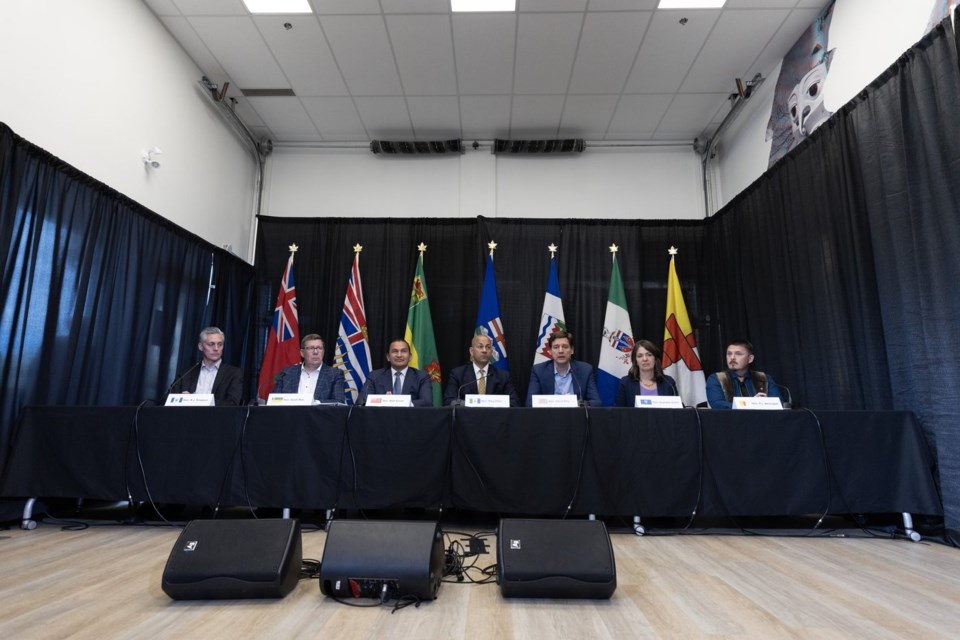YELLOWKNIFE — Canada's western premiers say they've agreed to identify, plan and develop new economic corridors to connect provincial resources to international markets.
A joint statement issued Thursday says doing so would boost Canada's market access in Asia and Europe while the country fights a trade war with the United States and China.
"Nation-building infrastructure in Western Canada, such as highways, railways, ports, airports, pipelines, nuclear projects and electricity transmission systems, are crucial for driving Canadian productivity growth, energy security and economic competitiveness," says the statement from the leaders of British Columbia, the Prairie provinces and the northern territories.
"This includes developing and transporting oil and gas, liquefied natural gas, uranium, electricity and hydroelectricity to Canadian and world markets, as well as in emerging opportunities such as hydrogen, biofuels and small modular nuclear reactors."
The premiers, who met for two days in Yellowknife, spoke at a closing news conference before the agreement was made public.
They said it's time for Western Canada to become the country's economic engine and the only thing standing in the way is the lack of infrastructure necessary to transport resources to new markets.
But the premiers also said they can't act alone, and they called on Prime Minister Mark Carney for support, specifically in connecting ports on the West Coast to the coast of Hudson Bay.
"This will build economic security and prosperity for all Canadians," the joint statement says of the port connection, adding a call for new federal funding programs for other economic corridors in remote and northern communities.
This year's annual meeting of western premiers comes two weeks before all Canada's premiers are to gather with Carney in Saskatoon.
Saskatchewan Premier Scott Moe said the western conference felt like "the start of a generationally beneficial discussion" that he hopes will continue when the premiers meet with Carney.
The joint statement says the premiers also spoke about housing, Arctic security, emergency preparedness and public safety, and they called for federal action on all files.
While the premiers put on a united front in their statement, some told reporters they couldn't agree on everything.
B.C. Premier David Eby said Alberta Premier Danielle Smith's recent calls for the revival of the Northern Gateway pipeline project — which would've connected Alberta oil to the northern coast of B.C. — and the cancelling of the B.C. north coast tanker ban are premature.
"In British Columbia, we have a pipeline that's publicly owned, that was put through over the objections of British Columbia — the Trans Mountain pipeline. And it is not operating at capacity," Eby said.
"If the urgency is to get product to tidewater, then I would start there with the conversations with the federal government about ensuring that this publicly owned infrastructure is used to its full capacity. And that seems like a great place to start, rather than opening up the pristine north coast to tanker traffic."
Eby, speaking at a later news conference, said B.C. and the Yukon made a separate agreement to work together to support electrification in the territory.
"In the Yukon right now, they face major challenges accessing electricity. They're very heavily reliant on diesel," Eby said.
"Electricity from B.C. would create jobs in B. C. and opportunity in British Columbia, as well as in the Yukon. And I'm looking forward to work with Premier (Ranj) Pillai on that."
Eby wasn't the only one to disagree with Smith during the conference. Local media reported there were two protests Wednesday in opposition to Smith.
The Dene Nation reportedly rallied to support treaty rights in the face of renewed talk of Alberta separation, while the other protested Smith's suite of transgender legislation last year.
Smith's government has outlawed doctors from prescribing puberty blockers and hormone therapy to those under 16 while also banning transgender athletes from competing in amateur female sports.
"Plainly stated it has become very unsafe to be (visibly) transgender in Alberta," the Northern Mosaic Network, which organized the protest, said Tuesday in a public letter to Northwest Territories Premier R.J. Simpson. The group added that Alberta's legislation has affected territory residents who are sent to Alberta for medical care.
Asked about the protests, Smith said her legislation doesn't affect N.W.T. residents and it's up to Carney to quell separatist desire and a broader separatist movement.
"I think in fact, if Prime Minister Mark Carney acts on the ideas in our communique today, that it would take the wind right out of any effort."
— By Jack Farrell in Edmonton, with files from Lisa Johnson
This report by The Canadian Press was first published May 22, 2025.
The Canadian Press




